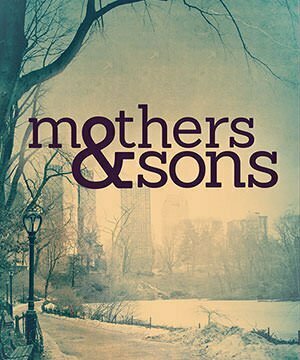Mothers and Sons
By Terrence McNally
Directed by Steve Scott
Produced by Northlight Theatre, Skokie
McNally Contemplates Old Wounds
Chicagoans had the opportunity to enjoy a miniature unofficial Terrence McNally festival last year. Eclipse Theatre Company dedicated their season to the AIDS-dramas he wrote in the late 1980s and early 1990s, and some other non-Equity companies mounted productions of his musicals. For those who know the works, as well as newcomers, the capstone is Northlight’s regional premiere of Mothers and Sons, a drama McNally wrote in 2013. The play is directed by Steve Scott, who also directed Eclipse’s production of The Lisbon Traviata, and recognizing the opportunity for a tie-in, Scott and Northlight artistic director BJ Jones hosted McNally at Bookends and Beginnings last fall for a signing of his latest anthology. Selected Works: A Memoir in Plays includes Mothers and Sons and the three plays Eclipse mounted last year, among others. The major theme that emerged from the interview and his recollections in the book is how McNally has documented great changes in gay life in American over his long career. Now seventy-seven, he writes in the anthology, McNally does not intend for Mothers and Sons to be his last play, but he wrote it knowing it might be, and he wanted to contextualize his works’ place in history.
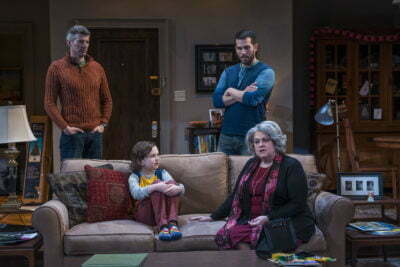
The play is a character study in one act, which is both good and bad. McNally has long excelled at writing complex characters who slowly reveal more information about themselves through lush, descriptive dialogue. The downside is that McNally himself admits to being uncomfortable with the one-act form, and the concept of a plot, generally. Instead, Katherine Gerard (Cindy Gold) show up uninvited at the home of Cal Porter (Jeff Parker), the life partner of her son, Andre, who died of something AIDS-related in 1994. (McNally used Katherine and Cal’s relationship as the basis of a short play and film he wrote during the heights of the AIDS crises called Andre’s Mother. Revisiting the characters in 2013 would obviously bring a different perspective to them.) Katherine does not like Cal, regards him as representative of the lifestyle she believes killed Andre, has not contacted him in nearly twenty years, and is deeply resentful of his happiness and family. And yet, she not only drops in, she stays.
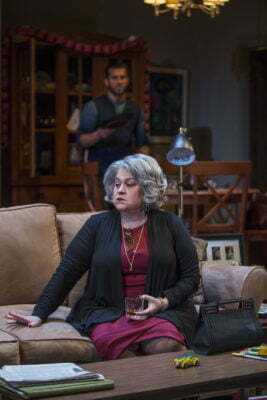 Why exactly she does so is explored over the next ninety minutes. By the end, her reasons are still ambiguous and can provide fodder for discussion among audience members. But actress Cindy Gold clearly has a good idea of who her character is, based on the strength of her performance. Katherine’s life story comes to us in bits and pieces, but what is important is that she never could bond with other people. Andre was the person she was closest to, but having felt stifled by her homophobia and general bitterness, he fled her and Dallas as soon as possible, and made for Manhattan. Even “Andre’s mother” was a role Katherine felt unfulfilled in and ill-suited for, and the irony is that a conventional, conservative life was just as miserable for her as it was for him. Now the husband she never loved is dead, and Katherine’s presence in Cal’s house is partly motivated by a vague desire for vengeance, partly by a search for anything that’s left of Andre, and partly by sheer desperate loneliness.
Why exactly she does so is explored over the next ninety minutes. By the end, her reasons are still ambiguous and can provide fodder for discussion among audience members. But actress Cindy Gold clearly has a good idea of who her character is, based on the strength of her performance. Katherine’s life story comes to us in bits and pieces, but what is important is that she never could bond with other people. Andre was the person she was closest to, but having felt stifled by her homophobia and general bitterness, he fled her and Dallas as soon as possible, and made for Manhattan. Even “Andre’s mother” was a role Katherine felt unfulfilled in and ill-suited for, and the irony is that a conventional, conservative life was just as miserable for her as it was for him. Now the husband she never loved is dead, and Katherine’s presence in Cal’s house is partly motivated by a vague desire for vengeance, partly by a search for anything that’s left of Andre, and partly by sheer desperate loneliness.
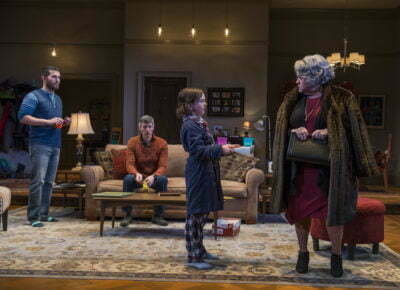
But what she discovers is that the world has moved on. Cal’s husband, Will (Benjamin Sprunger), is much younger. While he has great respect for those who went through AIDS and the other struggles of the last century, that’s history. In fact, Will often snippily corrects Cal for saying politically incorrect things; he certainly has no patience for Katherine, who he has never even met before. The feeling is mutual, but Katherine does get along a little better with Cal and Will’s six-year-old son, Bud (the amusing Ben Miller). Of course, she doesn’t believe that Cal and Will could possibly be competent parents, but she recognizes that what she thinks doesn’t matter anymore. Except, she says, nobody can force her to approve.
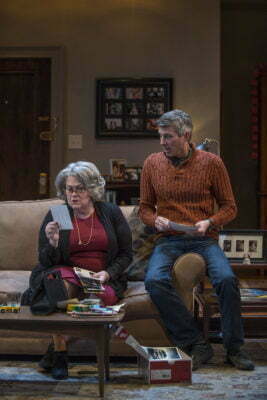 McNally is an author who places heavy emphasis on forgiveness and reconciliation. His 1993 play, A Perfect Ganesh, also centered on the self-inflicted pain of a mother who rejected her gay son, and then lost him. In Mothers and Sons, McNally gives Cal a strong desire to heal relationships as well. The resulting conflicts pit Cal against himself, as he wonders whether he is degrading himself (Parker does an outstanding job of conveying Cal’s mixed feelings), and with Katherine, because she is accustomed to anger and isolation. But it also pits him against Will, who truly has no desire to redeem Katherine, can hardly comprehend her, and would just as soon bury her. McNally seems to be suggesting that this is one of the biggest points of difference in the generational divide, although Cal suggests that it’s also a change in attitudes that often comes with age. Mothers and Sons relies on the kinds of verbal sparring that only happens in plays, and includes a fair share of monologues, as well. But Steve Scott’s cast convincingly deliver expertly crafted characters, and their clashes are no less impacting for relying on eloquent wit in place of noise.
McNally is an author who places heavy emphasis on forgiveness and reconciliation. His 1993 play, A Perfect Ganesh, also centered on the self-inflicted pain of a mother who rejected her gay son, and then lost him. In Mothers and Sons, McNally gives Cal a strong desire to heal relationships as well. The resulting conflicts pit Cal against himself, as he wonders whether he is degrading himself (Parker does an outstanding job of conveying Cal’s mixed feelings), and with Katherine, because she is accustomed to anger and isolation. But it also pits him against Will, who truly has no desire to redeem Katherine, can hardly comprehend her, and would just as soon bury her. McNally seems to be suggesting that this is one of the biggest points of difference in the generational divide, although Cal suggests that it’s also a change in attitudes that often comes with age. Mothers and Sons relies on the kinds of verbal sparring that only happens in plays, and includes a fair share of monologues, as well. But Steve Scott’s cast convincingly deliver expertly crafted characters, and their clashes are no less impacting for relying on eloquent wit in place of noise.
Recommended
Jacob Davis
[email protected]
Reviewed January 29, 2016
For more information, see Mothers and Sons’s page on Theatre in Chicago.
Playing at the North shore Center for the Performing Arts, 9501 Skokie Blvd, Skokie, Il. Tickets are $25-79, with discounts for students; to order, call 847-673-6300 or visit northlight.org. Performances are Wednesdays at 1:00 pm (except February 10) and 7:30 pm, Thursdays at 7:30 pm, Fridays at 8:00 pm, Saturdays at 2:30 pm and 8:00 pm, and Sundays at 2:30 pm and 7:00 pm (February 7 and 21) through February 27. Running time is ninety minutes.

